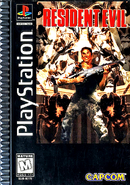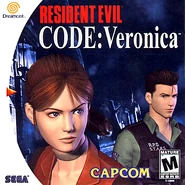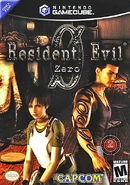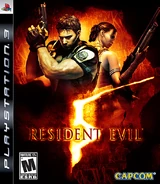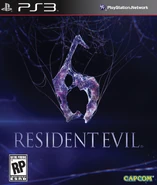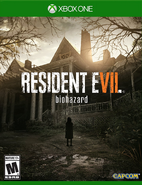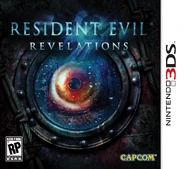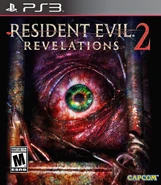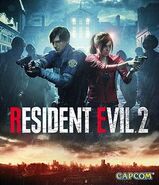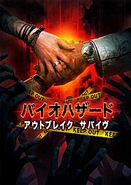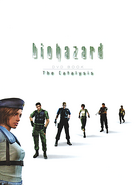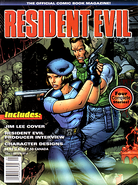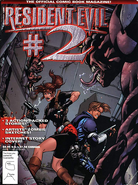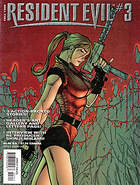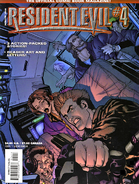Resident Evil, known in Japan as Biohazard, (バイオハザード Baiohazādo) is a horror media franchise created by Shinji Mikami and Tokuro Fujiwara,[1][2] and owned by Capcom. The franchise focuses on a series of The survival horror games focuses on outbreaks of zombies and other monsters created mainly by the Umbrella Corporation. The game series has spawned a bigger media franchise which includes live-action films, animated films, comic books, novels, audio dramas, and merchandise.
The first Resident Evil game, released in 1996, has grown to encompass numerous sequels of various genres, incorporating elements of action, exploration, and puzzle solving, and storylines inspired by horror and action films. Resident Evil has been credited with popularizing survival horror games, as well as re-popularizing zombies in mainstream popular culture from the late 1990s onwards (along with The House of the Dead), leading to a renewed interest in zombie films during the 2000s. Resident Evil is Capcom's best-selling video game franchise,[3] with over 100 million sold worldwide as of June 2020.[4] The Resident Evil live-action film series is also the highest-grossing film series based on video games.
List of games
Main games
- Resident Evil - (1996)
- Resident Evil 2 - (1998)
- Resident Evil 3: Nemesis - (1999)
- Resident Evil CODE: Veronica - (2000)
- Resident Evil Zero - (2002)
- Resident Evil 4 - (2005)
- Resident Evil 5 - (2009)
- Resident Evil 6 - (2012)
- Resident Evil 7: Biohazard - (2017)
- Resident Evil Village - (2021)
Spin-offs and other games
- Resident Evil Survivor - (2000)
- Resident Evil Gaiden - (2001)
- Resident Evil Dead Aim - (2003)
- Resident Evil Outbreak - (2003)
- Resident Evil Outbreak: File 2 - (2004)
- Resident Evil: The Mercenaries 3D - (2011)
- Resident Evil: Revelations - (2012)
- Minna to Biohazard Clan Master - (2012, Japan only)
- Biohazard Pachislot - (Japan only) - A game for an arcade machine that is a combination of a pinball and slot machine.
- Biohazard: Team Survive
- Resident Evil: Revelations 2 - (2015)
- Umbrella Corps - (2016)
Collections/Remakes
- Resident Evil Director's Cut - (1998)
- Resident Evil - (2002)
- Resident Evil HD Remaster - (2015)
- Resident Evil Zero HD Remaster - (2016)
- Resident Evil Origins Collection - (2016)
- Resident Evil 2 - (2019)
- Resident Evil 3 - (2020)
Mobile Phone games
- Resident Evil Confidential Report File 1 & 2 - (2006) - Two turned-based games revolving around a rookie cop and an FBI agent responding to a distress call from an old school dormitory.
- Resident Evil: The Missions - (2006) - Unlike its fellow mobile phone game, Confidential Report, it is designed to be a series of short challenges which can be completed in a matter of minutes, and does not attempt to provide any new storyline. In the game, players primarily control Jill Valentine, although other characters can be unlocked through continued play.
- Biohazard: The Stories - (Japan only) - The sequel to The Missions, this is a port of the mini-game "The Mercenaries".
- Biohazard: The Episodes - (Japan only) - The second sequel to the The Missions, this is based loosely on Resident Evil 3: Nemesis.
- Biohazard: The Operations - (Japan only) - Another sequel to the The Missions, this is based loosely on the remake of Resident Evil.
- Resident Evil: Genesis - (2008)
- Resident Evil: Degeneration - (2008)
- Resident Evil Uprising - sequel to Genesis, covering the events of Resident Evil 2.
- Resident Evil Outbreak: Survive - for the GREE Mobile Platform.
Films
Animated movies
- Biohazard 4D-Executer - (2000) (Japan only)
- Resident Evil: Degeneration - (2008)
- Resident Evil: Damnation - (2012) - sequel to Degeneration.
- Resident Evil: Vendetta - (2017)
Live-action
It should be noted that the live-action films by Paul W. S. Anderson are only loosely based on the games, and the story and character development are completely different from the video game franchise.
- Resident Evil - (2002)
- Resident Evil: Apocalypse - (2004)
- Resident Evil: Extinction - (2007)
- Resident Evil: Afterlife - (2010)
- Resident Evil: Retribution - (2012)
- Resident Evil: The Final Chapter - (2017)
In August, Johannes Roberts, director of films such as "47 Meters Down:Uncaged", confirmed that he will be making a spiritual reboot to the first Resident Evil live action film.
TV series
- Resident Evil (live-action Netflix series) - (TBA)
- Resident Evil: Infinite Darkness - (2021)
History
The development of the first Resident Evil began in 1993 when Tokuro Fujiwara conceived it as a remake of his earlier 1989 Capcom horror game Sweet Home, when the project was led by Shinji Mikami.[5][6] When in late 1994 marketing executives were setting up to bring the game to the United States, it was pointed out that a DOS game had been recently registered under that name, so a contest was held among company personnel to choose a new name; this competition turned up Resident Evil, the name currently known in the west.[7] Resident Evil made its debut on the PlayStation in 1996 and was later ported to the Sega Saturn.
The first entry in the series was the first game to ever be dubbed a "survival horror", a term coined for the new genre it initiated,[8] and its critical and commercial success[9] led to the production of two sequels, Resident Evil 2 in 1998 and Resident Evil 3: Nemesis in 1999, both for the PlayStation. A port of Resident Evil 2 was released for the Nintendo 64. In addition, ports of all three were released for Microsoft Windows. The fourth game in the series, Resident Evil – Code: Veronica, was developed for the Dreamcast and released in 2000, followed by ports of Resident Evil 2 and Resident Evil 3. Resident Evil Code: Veronica was later re-released for Dreamcast in Japan in an updated form as Code: Veronica Complete, which included slight changes, many of which revolved around story cutscenes. This updated version was later ported to the PlayStation 2 and GameCube under the title Code: Veronica X.
Despite earlier announcements that the next game in the series would be released for the PlayStation 2, which resulted in the creation of an unrelated game titled Devil May Cry, series' creator and producer Shinji Mikami intended to make the series exclusively for the GameCube.[10] The next three games in the series—a remake of the original Resident Evil and the prequel Resident Evil Zero, both released in 2002, as well as Resident Evil 4—were all released initially as GameCube exclusives. Resident Evil 4 was later released for Windows, PlayStation 2 and Wii (as well as downloadable HD versions for the PlayStation 3 and Xbox 360, which were released in tandem with an HD port of Resident Evil: Code Veronica X). In addition, the GameCube received ports of the previous Resident Evil sequels. Despite this exclusivity agreement between Capcom and Nintendo, Capcom released several Resident Evil titles for the PlayStation 2 that were not considered direct sequels.
A trilogy of GunCon-compatible light gun games known as the Gun Survivor series featured first person game play. The first, Resident Evil Survivor, was released in 2000 for the PlayStation and PC, but received mediocre reviews.[11] The subsequent games, Resident Evil: Survivor 2 Code: Veronica and Resident Evil: Dead Aim, fared somewhat better.[12] Dead Aim is the fourth Gun Survivor game in Japan, with Gun Survivor 3 being the Dino Crisis spin-off Dino Stalker. In a similar vein, the Chronicles series features first person game play, albeit on an on-rails path. Resident Evil: The Umbrella Chronicles was released in 2007 for the Wii, with a follow up, Resident Evil: The Darkside Chronicles released in 2009 (both were later ported to the PlayStation 3 in 2012).[13]
Resident Evil Outbreak is an online game for the PlayStation 2, released in 2003, depicting a series of episodic storylines in Raccoon City set during the same time period as Resident Evil 2 and Resident Evil 3. It was the first in the series and the first survival horror title to feature cooperative gameplay and online multiplayer support.[14] It was followed by a sequel, Resident Evil Outbreak File #2. Raccoon City is a metropolis located in the Arklay Mountains of the Midwestern United States that succumbed to the deadly T-virus outbreak and was consequently destroyed via a nuclear missile attack issued by the United States government. The town served a critical junction for the series' progression as one of the main catalysts to Umbrella's downfall as well as the entry point for some of the series' most notable characters.
Resident Evil Gaiden is an action-adventure game for the Game Boy Color featuring a role-playing-style combat system. There have been several downloadable mobile games based on the Resident Evil series in Japan. Some of these mobile games have been released in North America and Europe through T-Mobile. At the Sony press conference during the E3 2009, it was announced that Resident Evil Portable would be released for the PlayStation Portable,[15][16][17] described as an all-new title being developed with "the PSP Go in mind" and "totally different for a Resident Evil game". However, as of 2012, no further announcements have been made, and the game is considered to have been cancelled.[18][19]
In March 2011, Capcom revealed the third-person shooter Resident Evil: Operation Raccoon City, which was developed by Slant Six Games for the PlayStation 3, Xbox 360 and Microsoft Windows and released in March 2012. A survival horror game for the Nintendo 3DS, Resident Evil: Revelations, was released in February 2012.[20] In October of the same year, the next numbered entry in the main series, Resident Evil 6, was released to mixed reviews,[21] but enthusiastic pre-order sales.[22]
In 2013, producer Masachika Kawata said the Resident Evil franchise would return to focus on elements of horror and suspense over action, adding, "Survival horror as a genre is never going to be on the same level, financially, as shooters and much more popular, mainstream games. At the same time, I think we need to have confidence to put money behind these projects, and it doesn't mean we can't focus on what we need to do as a survival horror game to meet fan's needs."[23] Resident Evil: Revelations 2, an episodic game set between Resident Evil 5 and Resident Evil 6, was released in March 2015. A team-based multiplayer game set in the series's universe, Umbrella Corps, was released in June 2016.[24]
Resident Evil 7: Biohazard was released for Windows, PlayStation 4 and Xbox One in January 2017.[25] Set in a dilapidated mansion in Louisiana, the game uses a first-person perspective and returns to the series' survival horror roots.[26] Unlike Resident Evil 5 and Resident Evil 6, the gameplay emphasizes horror and exploration over action.[27]
In August 2015, Capcom announced that a full remake of Resident Evil 2 was in development.[28] Going almost three years with no updates on its development, a trailer and gameplay footage were shown at E3 2018, along with a worldwide release date of January 25, 2019.[29][30] Releasing for the PlayStation 4, Windows, and Xbox One, the remakes uses the RE Engine, which was also used for Resident Evil 7.[31]
Resident Evil Village, the newest upcoming main installment announced in June 2020,[32] is slated for a 2021 release.
Gallery
Box Art
Merchandise
References
- ↑ http://www.lemonde.fr/pixels/article/2014/10/14/shinji-mikami-aux-sources-du-jeu-d-horreur_4502400_4408996.html
- ↑ http://www.glitterberri.com/developer-interviews/tokuro-fujiwara/
- ↑ http://www.capcom.co.jp/ir/english/finance/salesdata.html
- ↑ http://www.capcom.co.jp/ir/english/news/html/e200612b.html
- ↑ Resident Evil Creator Shinji Mikami Reflects on the Series' Roots, GameSpot (March 22, 2016)
- ↑ Time Machine: Sweet Home, Computer and Video Games
- ↑ http://kotaku.com/5204463/why-was-biohazard-changed-to-resident-evil
- ↑ https://web.archive.org/web/20080906213420/http://gamespot.com/gamespot/features/video/res_evil/index.html
- ↑ cite journal|quote=The "multi-million dollar franchise... Evil Capcom's largest" and "the original Resident Evil" is "one of the most important games of all time." |journal=Game Informer |issue=174 |date=October 2007|page=132|title=Enter The Survival Horror... A Resident Evil Retrospective
- ↑ http://www.gamespot.com/gamecube/action/residentevil/review.html
- ↑ http://psx.ign.com/articles/163/163923p1.html
- ↑ https://web.archive.org/web/20050208233247/http://www.gamespot.com/ps2/action/residentevildeadaim/
- ↑ http://www.metacritic.com/game/playstation-3/resident-evil-chronicles-hd-collection
- ↑ http://www.gameinformer.com/b/features/archive/2011/12/30/guinness-world-records-2012-gamer-s-edition-preview.aspx
- ↑ http://psp.ign.com/articles/989/989522p1.html
- ↑ https://www.webcitation.org/6BmAxJJB4?url=http://www.1up.com/news/psp-resident-evil-portable-2010
- ↑ http://www.joystiq.com/2009/06/02/zombies-infecting-psp-in-resident-evil-portable/
- ↑ http://psp.ign.com/articles/992/992945p1.html
- ↑ http://www.siliconera.com/2009/06/08/resident-evil-portable-totally-different-for-a-resident-evil-game/
- ↑ http://www.computerandvideogames.com/296595/news/resident-evil-revelations-out-2012-new-concept-art/
- ↑ http://uk.ign.com/articles/2012/10/01/resident-evil-6-review
- ↑ http://www.siliconera.com/2012/10/03/resident-evil-6-ships-4-5-million-copies-worldwide/
- ↑ http://www.ign.com/articles/2013/01/31/resident-evil-will-return-to-its-roots
- ↑ http://www.shacknews.com/article/91287/tgs-2015-resident-evil-umbrella-corps-will-help-usher-in-series-20th-anniversary
- ↑ "Capcom begins 'The World of Resident Evil 7' short video series". Gematsu.
- ↑ http://www.polygon.com/e3/2016/6/15/11940734/resident-evil-7-biohazard-e3-2016
- ↑ http://www.eurogamer.net/articles/2016-06-15-if-you-like-lots-of-guns-in-resident-evil-7-isnt-for-you
- ↑ http://www.pcgamer.com/resident-evil-2-remake-is-in-development/
- ↑ https://www.polygon.com/e3/2018/6/11/17443046/resident-evil-2-remake-trailer-release-date-e3-2018
- ↑ https://gematsu.com/2018/06/resident-evil-2-announced-ps4-xbox-one-pc
- ↑ http://www.ign.com/articles/2018/06/12/e3-2018-resident-evil-2-remake-release-date-announced
- ↑ https://www.gamesradar.com/resident-evil-8-village-trailer-breakdown/
External Links
Official
- Official Resident Evil website
- Official Japanese website
- Official community site at Capcom Unity
- Biohazard Pachislot site
- Wikipedia article



